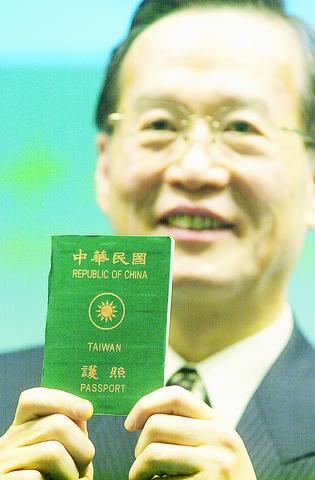Starting Sept. 1, the country will begin issuing a new version of passports with the word "Taiwan" printed on the cover in Roman script, the Ministry of Foreign Affairs said yesterday, stressing that the move was governed by practical considerations and not politics.
"It's our hope to begin issuing the new passports on Sept.1,"Minster of Foreign Affairs Eugene Chien (簡又新) said yesterday afternoon.
Chien held the press briefing after a closed-door meeting with around 10 lawmakers from several parties to discuss the long-delayed passport reform project.

PHOTO: GEORGE TSORNG, TAIPEI TIMES
Dubbing the meeting as "harmonious," Chien said the ministry planned to issue the new passports on Sept. 1 at the earliest, despite some legislators' suggestion that the scheme should be implemented as soon as possible.
It is estimated that there are still about 330,000 old passports in stock and that they will run out by the end of September, Chien said.
According to the plan, the word "Taiwan" in Roman letters will be added to the middle of the cover. The rest of the current design -- including the national emblem and the nation's name, Republic of China (ROC) written in English and Chinese -- will remain, Chien said.
The minister said the changes are practical and not the result of any political strategy.
In fact, Chien said, the foreign ministry found the whole process of passport reform difficult because it involved the sensitive issue of reunification versus independence in Taiwan.
"We've endeavored to find the great common denominator that everyone agrees on, without running the risk of lapsing into the political difficulties I've just mentioned," he said.
Chien said he hoped Taiwanese nationals traveling with the new passports would no longer be mistaken for travelers from China, as the new covers are expected to help distinguish Republic of China passports from People's Republic of China passports.
Chien acknowledge that many citizens had complained about the confusion caused in other countries by having an ROC passport.
To illustrate his point he told how two ministry officials were recently "trapped" while in transit at the Rome airport because their ROC passports were mistaken for PRC passports by airline crews.
The minister dismissed the possibility of having the word "Taiwan" placed inside the passport, saying that placing the word on the cover would greatly help to distinguish this country's passport from PRC ones.
The ministry will explain the change to foreign countries and airline companies around the globe in a timely manner, Chien said.
Officials, however, were silent when asked by the press to clarify related laws to regulate the period during which both the current passports and new passports will be circulated among Taiwanese nationals.
Several recent polls have shown that more than half of the respondents backed the proposal to add the word "Taiwan" to the current passport covers to help ROC passport holders during their foreign travels.

Taiwan has received more than US$70 million in royalties as of the end of last year from developing the F-16V jet as countries worldwide purchase or upgrade to this popular model, government and military officials said on Saturday. Taiwan funded the development of the F-16V jet and ended up the sole investor as other countries withdrew from the program. Now the F-16V is increasingly popular and countries must pay Taiwan a percentage in royalties when they purchase new F-16V aircraft or upgrade older F-16 models. The next five years are expected to be the peak for these royalties, with Taiwan potentially earning

STAY IN YOUR LANE: As the US and Israel attack Iran, the ministry has warned China not to overstep by including Taiwanese citizens in its evacuation orders The Ministry of Foreign Affairs (MOFA) yesterday rebuked a statement by China’s embassy in Israel that it would evacuate Taiwanese holders of Chinese travel documents from Israel amid the latter’s escalating conflict with Iran. Tensions have risen across the Middle East in the wake of US and Israeli airstrikes on Iran beginning Saturday. China subsequently issued an evacuation notice for its citizens. In a news release, the Chinese embassy in Israel said holders of “Taiwan compatriot permits (台胞證)” issued to Taiwanese nationals by Chinese authorities for travel to China — could register for evacuation to Egypt. In Taipei, the ministry yesterday said Taiwan

‘LIKE-MINDED PARTNER’: Tako van Popta said it would be inappropriate to delay signing the deal with Taiwan because of China, adding he would promote the issue Canadian senators have stressed Taiwan’s importance for international trade and expressed enthusiasm for ensuring the Taiwan-Canada trade cooperation framework agreement is implemented this year. Representative to Canada Harry Tseng (曾厚仁) in an interview with the Central News Agency (CNA) said he was increasingly uneasy about Ottawa’s delays in signing the agreement, especially as Ottawa has warmed toward Beijing. There are “no negotiations left. Not only [is it] initialed, we have three versions of the text ready: English, French and Mandarin,” Tseng said. “That tells you how close we are to the final signature.” Tseng said that he hoped Canadian Prime Minister Mark Carney

POSITIVE DEVELOPMENT: Japan and the US are expected to hold in-depth discussions on Taiwan-related issues during the meeting next month, Japanese sources said The holding of a Japan-US leaders’ meeting ahead of US President Donald Trump’s visit to China is positive news for Taiwan, former Japan-Taiwan Exchange Association representative Hiroyasu Izumi said yesterday. After the Liberal Democratic Party’s landslide victory in Japan’s House of Representatives election, Japanese Prime Minister Sanae Takaichi is scheduled to visit the US next month, where she is to meet with Trump ahead of the US president’s planned visit to China from March 31 to April 2 for a meeting with Chinese President Xi Jinping (習近平). Japan and the US are expected to hold in-depth discussions on Taiwan-related issues during the